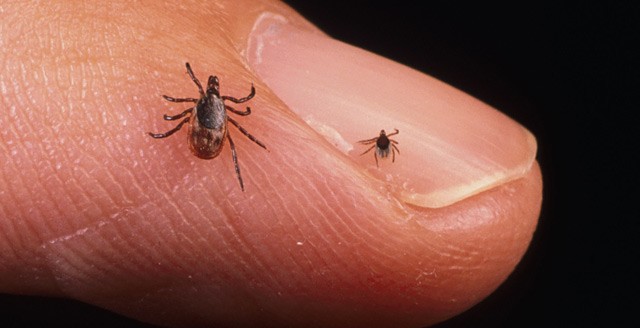
Scientists have identified the cause of a Kansas farmer’s mysterious death this summer as “Bourbon virus,” a newly discovered infectious disease that experts say is unlike anything they’ve seen before in the U.S.
Thought to be transmitted by ticks, the virus “was fast-moving and severe, causing lung and kidney failure, and shock,” The New York Times reported, killing the previously healthy man after only 10 days in the hospital.
Together, Centers for Disease Control and Prevention (CDC) and University of Kansas Hospital researchers identified the virus as a thogotovirus, part of a larger type of viruses called orthomyxoviruses, Dr. Dana Hawkinson, M.D., an infectious disease specialist at The University of Kansas Hospital said in a video statement.
Bourbon virus, named after Bourbon County, Kansas, where the only known patient lived, is similar to viruses seen previously in Eastern Europe, Africa and Asia, said Dr. Hawkinson, but nothing like it had ever been identified in the Western Hemisphere before.
He called the experience of working with a never-before-seen virus frustrating, as the lack of understanding of the illness left many questions unanswered for both the patient’s family and the researchers. “We don’t know the full spectrum of disease because it’s the first case,” he said. For example, no one knows whether or not the disease is usually deadly or if there could be more mild cases from which future patients could recover.
According to a press release from the Kansas Department of Health and Environment, scientists are planning to test for Bourbon virus in other local residents, with similar symptoms, who have tested negative for other tick-borne diseases in the past. They also plans to collect and test ticks and other insects for the new virus.
Symptom include fever, loss of appetite, muscle aches and a general feeling of malaise. But while similar tick-borne illnesses typically are treated with antibiotics, this disease is transmitted by a virus, and therefore won’t respond to the typical antibiotic medication. Indeed, the Kansas patient did not respond to traditional therapies after testing negative for typical tick-borne diseases at the University of Kansas Hospital, New York Daily News reported.
According to the CDC, the United States is home to a variety of tick-borne illnesses, including Rocky Mountain spotted fever, tick-borne relapsing fever, Southern Tick-Associated Rash Illness, Q fever, babesiosis, ehrlichiosis, and tularemia.
According to the Centers for Disease Control and Prevention, the United States is home to a variety of tick-borne illnesses, including Rocky Mountain spotted fever, tick-borne relapsing fever, Southern Tick-Associated Rash Illness, Q fever, babesiosis, ehrlichiosis, and tularemia. Lyme disease is the most common tick-borne illness in the U.S., with over 27,000 confirmed cases in 2013, the most recent year from which data are available.
Cold weather typically keeps ticks and other disease-transmitting insects at bay, but from roughly April to September — when ticks are most active — the CDC recommends taking the following precautions:
- Avoid wooded and bushy areas with high grass and leaf litter;
- Use insect repellent containing DEET when outdoors;
- Use products that contain permethrin on clothing;
- Wear clothing with long sleeves and pants;
- Bathe or shower as soon as possible after coming indoors to wash off and more easily find ticks that are crawling on you;
- Conduct a full-body tick check after spending time outdoors; and
- Examine gear and pets, as ticks can “ride” into the home and attach to a person later (and pets are also vulnerable to many tick-borne illnesses, including Lyme disease — so don’t forget about them!)
